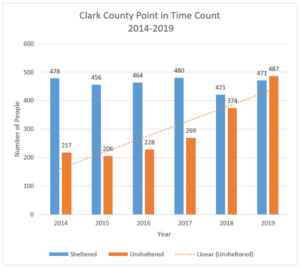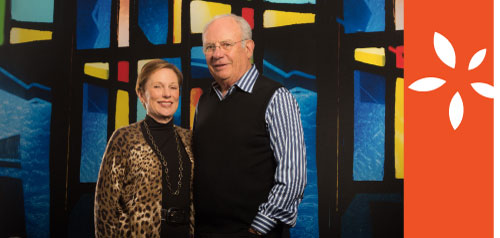I don’t have to tell you that our region is facing a prolonged housing crunch. The stories of soaring rents, low vacancy rates, longtime residents priced out, community opposition to shelters and roving tent encampments are all alarming reminders.
 Recent homelessness counts in Clark County and Cowlitz County show that our circumstances aren’t improving either. The effects of escalating housing costs are taking their toll on cities and smaller towns across southwest Washington. This problem is especially acute all along the west coast, where median home prices are five times greater than incomes. Economists commonly use this price-to-income ratio when tracking home affordability; the higher the ratio, the less affordable the home.
Recent homelessness counts in Clark County and Cowlitz County show that our circumstances aren’t improving either. The effects of escalating housing costs are taking their toll on cities and smaller towns across southwest Washington. This problem is especially acute all along the west coast, where median home prices are five times greater than incomes. Economists commonly use this price-to-income ratio when tracking home affordability; the higher the ratio, the less affordable the home.
The rental market has similar strains. According to Metro, rents in the metropolitan area increased 63 percent during the ten years leading up to 2015. In that same span, renter incomes increased only 39 percent. Current data from the National Low Income Housing Coalition shows that a person needs to earn $23.73 per hour In Clark County to rent a one-bedroom apartment affordably, yet the estimated mean renter wage is $15.88 per hour.
These lopsided figures are the product of many forces working in tandem to drive up costs. The circumstances are even worse for people with higher socio-economic barriers: people of color, disabled and underemployed folks, and seniors and young adults.
The causes of this affordable housing crisis are well documented. They range from economic forces like land and constructions costs to policy issues like zoning, permitting and tax credits. Identifying these causes is the first step toward making necessary changes. Through creative partnerships and community action, we will find collaborative solutions that provide affordable and adequate housing options to people at all income levels.
A Few Philanthropic Tools
The Community Foundation for Southwest Washington is involved in many of these efforts. Our organization sits in a unique position as a funder. We have a history of connecting donors to worthy causes, and resources to pressing needs. However, we also deploy unique philanthropic tools to spark change. In both cases, we’re becoming more intentional about deciding when and how we can make the most impact.
Freeing Financial Capital

Philanthropic and public dollars come with restrictions that limit an organization’s ability to pursue opportunities or to shift funds where they’re needed most. Understanding this, the Community Foundation began exploring new funding strategies like impact investment loans and grants for unrestricted operating support to its grantees like Housing Initiative LLC.
Over four years, the Housing Initiative has leveraged unrestricted grants and impact investment loans to incubate a new model for affordable housing development that utilizes private market strategies to build and manage affordable housing more efficiently. Its innovative approach translates to rental rates that are affordable to those earning less than 30 percent of the area’s median income. This year, the organization will break ground on two such projects, estimated to add 64 affordable units to the local housing stock. A third project on the drawing board will likely double that number by 2021.
Leveraging Reputational Capital
By incurring the early risk of supporting this budding organization, the Community Foundation demonstrated a high level of confidence that attracted more funding to the table. Our $400,000 impact investment loan, which has been repaid with interest, bolstered the Housing Initiative’s efforts to secure an extra $3.25 million in from the Clark County, the City of Vancouver, the Vancouver Housing Authority and PeaceHealth. Using our funding as a stamp of approval, some grantees have drawn the interest of other funders.
Educating our Community
The Housing Initiative LLC operates under the umbrella of The Council for the Homeless, an organization that was instrumental in urging the City of Vancouver to create an Affordable Housing Task Force. In doing so, the organization jumpstarted what became the driving force behind Proposition 1, Vancouver’s affordable housing levy. As this measure approached voters, the Community Foundation aided public understanding and education by publishing an objective white paper detailing the city’s escalating affordability issues.
Providing independent research and education such as this, the Foundation is able to advance policy changes that promote affordable housing development. Our part in the larger awareness effort helped pass the measure comfortably. Today, the fund is living up to its promise–raising $6 million per year and outpacing estimates to help increase affordable housing. It also caught the attention of Governor Jay Inslee, who honored it with a Smart Communities Award earlier this month.
Funding Research
The same year, Community Foundation fundholders Lee and Connie Kearney approached the Foundation with concerns about our region’s behavioral healthcare services. Noticing a lack of information to identify gaps in services or opportunities for collaboration, the Kearneys partnered with the Community Foundation to produce a Behavioral Health Community Needs Assessment.

The findings provided comprehensive data and a common direction for organizations to rally around. It also showed a lack of supportive, affordable housing as one of the leading threats to effective care. This study equipped providers with the data needed to strengthen their case for funding and reforms in southwest Washington.
In May, their collective efforts resulted in a $1.7 million state allocation for the Tenny Creek Assisted-Living Facility, which will provide stable housing for 40 of Clark County’s most vulnerable tenants.
Supporting Collaborative Approaches
The assessment also encouraged new collaborations, including the Housing and Health Innovation Partnership. This new collaborative of funders works to create cross-sector financing, partnerships, and strategies for resolving policy and system barriers. The Community Foundation manages much of the funding, while also providing operating support that allows the group to maintain forward progress.
The partnership includes staff from the Vancouver Housing Authority, Clark County Community Services, the Southwest Washington Accountable Community of Health and the Community Foundation. Utilizing the research and reports available, we’re working together to fill existing gaps and supplement needs in order to achieve greater care across residential, supportive and recovery housing in southwest Washington.
More Than A Roof
When people hear “affordable housing,” they imagine government-funded, low-income housing. This is one segment, and a particularly important support for those living in poverty. But the picture is much broader and complicated. In our current crisis, individuals with steady jobs like teachers, medical assistants and service workers, whose salaries disqualify them for housing assistance, have been priced out or forced to spend an inadvisable amount on rent each month.
What type of impact does this have on communities? Some describe it as catastrophic, and not without reason, because housing is more than four walls, a roof and amenities. A stable home is also a platform for prosperity. Housing improves our prospects for health, education, employability and so many other quality-of-life indicators.
This is why funders, nonprofits, policymakers and researchers are increasingly exploring these intersections to use housing as a way to deliver quality services and supports to those who need them most.
Home is where we live, which ties it to all we do and hope for. And our hopes are not all that different when you look across zip codes and addresses. Unfortunately, one’s ability to realize their dreams is becoming more and more dependent on where they live and the cost of that home.
We plan to pursue appropriate and effective solutions to increase affordable housing by making use of our entire philanthropic toolbelt. Doing so will strengthen the efforts of our grantees and inspire fundholders, donors and community leaders to join in solving the crisis. Only by working together will we improve policies and systems, and open greater housing opportunities for everyone.
